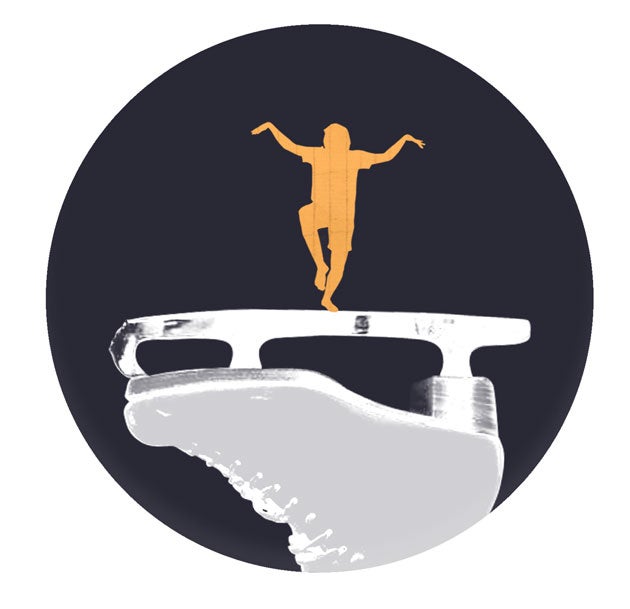I was not, by any measure, an athletic child. My tiny stick legs never moved quite fast enough, and my hand-eye coordination bordered on non-existent. Despite my parents' noble attempts to engage my inner athlete, signing me up for everything from softball to tennis lessons, I showed neither athletic interest nor potential. At 10, I found myself coordinating dance routines on the football field with the similarly indifferent centre-fielder.
Then, when I was 11, I took up ice skating. At the time, my enthusiasm for sports directly corresponded to the sport's sparkle content. And as far as I could tell, ice skating's sparkle content was high. There were glittery costumes and colourful dresses and practice outfits made of shiny Lycra and chiffon. Dressing up, wearing make-up, and trying to look pretty were actually a part of the sport. This, I decided, was a sport I could love.
My parents, thrilled they had at last found an athletic endeavour I enjoyed, signed me up for lessons with one of the skating club's coaches. They bought me a new pair of skates, white and smooth as eggshells, and invested in a few sleek practice outfits. Committed to putting my new wardrobe to use, I practised religiously, after school and at weekends, and to my surprise (and possibly my parents') I wasn't terrible. I wasn't good, per se, but I could jump and spin and skate backwards and forwards without falling. With every new jump and spin I learnt, my confidence ballooned, as did my hunger for learning more: more jumps, more choreography, more footwork, more everything. Then one day, after warming up with a few laps around the rink, my coach, Lisa, proposed an idea: what did I think about skating in my first competition?
I loved the idea. A competition presented an opportunity to show my family and friends I possessed at least a modicum of athleticism and grace. More than that, it provided a chance to wear my first proper skating costume. With my coach, I developed my first routine, a 90-second programme set to an orchestral version of The Beatles' "Yellow Submarine". After weeks of practising toe loops and Salchows and sit spins, my coach smiled and patted me on the shoulder. I was ready.
On the day of the competition, I stepped on to the ice to warm up, wearing a fiery coral dress studded with brilliant crystals. My mum had sewn the crystals on to the dress herself, threading the delicate beads on to the bodice and along the hem of the skirt. The costume was electric, setting off my petite frame against the bright white ice. As I warmed up, I felt like Nancy Kerrigan or Kristi Yamaguchi.
Unfortunately, I did not look like either of them once I began my performance. With the opening musical flourish, I began as I always had, with a twirl and a series of three-turns, but then, 10 seconds into my routine, I looked out across the ice at the audience and noticed everyone's eyes glued to me. I froze. Everyone was staring at me – watching, waiting. My mind went blank. I could not remember what came next.
Instead of doing three-turns and crossovers, I meandered across the ice, like a vagabond wandering into the mist, the tune of "Yellow Submarine" blaring in the background. I scanned the crowd for my coach or my mother, hoping one of them would be able to stop the music or tell me what to do. But I couldn't find either of their faces in the crowd. All I could see were a bunch of strangers, staring in bewilderment as I drifted aimlessly across the ice. I wanted to shout, "Mum! Lisa! Stop the music!". But I was on my own. I could either give up and skate off the ice or keep going and somehow save this routine. I kept going.
Through luck or sheer will, or a combination thereof, the choreography rushed back to me, and I carried on with the routine. I finished with great gusto and, to my surprise, ended up winning the bronze. Needless to say, the competition wasn't steep. But I didn't care. I'd won the bronze, and I'd done it on my own.
The competition was the first of several, all of which followed a similar pattern of disaster and surprise, and eventually I gave up the sport for other non-athletic pursuits to which I was better suited. But long after I'd quit ice skating, that first competition stuck with me. There have been many times since that day when, faced with one of life's trials, I have felt lost and alone, without any immediate relief in sight. Every time, I've had two clear choices: give up and walk off the ice, or keep skating until I figure out, in my own way and on my own time, what to do next. Every time, I choose to skate.
'The Secret Supper Club', by Dana Bate, is out now, published by Canvas
Subscribe to Independent Premium to bookmark this article
Want to bookmark your favourite articles and stories to read or reference later? Start your Independent Premium subscription today.


Join our commenting forum
Join thought-provoking conversations, follow other Independent readers and see their replies